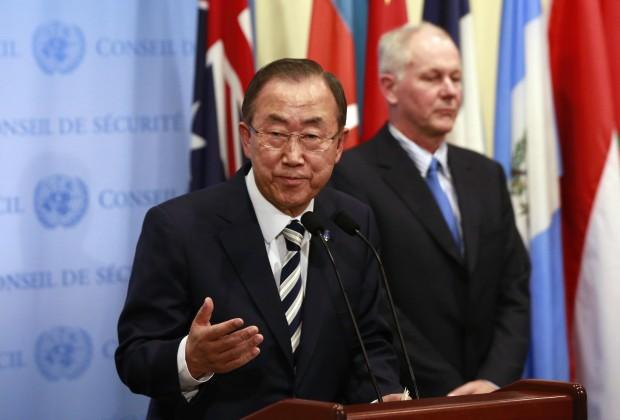UN Says ‘Unequivocally’ Chemical Weapons Were Used in Syria
United Nations Secretary-General Ban Ki-moon speaks to the news media after briefing the Security Council on a new U.N. report on the use of chemical weapons in Syria.
"The findings are beyond doubt and beyond the pale," said UN Secretary General Ban Ki-Moon.
But neither Ban nor the text of UN report would assign blame for the chemical attack that occurred outside Damascus last month. Still, the secretary general was blunt.
"This is a war crime," Ban said in a statement.
President Obama has welcomed a deal that the US reached this weekend with Russia to eliminate Syria's chemical weapons stockpile. He called it a good step forward, but added that the plan will have to be implemented properly.
UN weapons inspectors visited the site of the August 21 attack first hand and they interviewed more than 50 survivors. They collected soil and munitions samples, along with hair, urine and blood samples from victims. It all adds up to what the inspectors said was "clear and convincing evidence" that rockets containing the nerve agent sarin were used.
"It is for others to decide whether to pursue this matter further to determine responsibility," Ban said during a news conference Monday afternoon in New York. "We may all have our own thoughts on this, but I will simply say that this is grave crime. And those responsible must be brought to justice as soon as possible."
But the Obama administration has already made up its mind. It lays the blame for the worst chemical attack in a quarter-century squarely at the feet of Syrian government forces.
Speaking in Paris today, Secretary of State John Kerry said the US and Russia have agreed that Syria must get rid of its of chemical weapons – or face serious consequences.
"President Obama, and I have repeated his statement, has warned that should diplomacy fail, the military option is still on the table."
France and Britain are thought to be on board with the US in pushing for a tough new Security Council resolution on Syria's chemical weapons stockpile. But the Russians have rejected the idea of threatening military intervention.
Meanwhile, Turkey said its warplanes shot down a Syrian military helicopter on Monday.
Deputy prime minister, Bulent Arinc said the Syrian helicopter violated Turkish airspace. It was warned repeatedly, he said, and then fired on with a missile, causing it to fall on Syrian soil.
Turkey's government has become a fierce critic of Syrian president Bashar Al-Assad. It has given refuge to Syrian rebels and advocated for greater outside military intervention in Syria.
A UK-based spokesman with the opposition Syrian National Coalition, Walid Saffour told the BBC that all the international attention on Syria's chemical weapons could turn out to be a distraction from the damage still being inflicted by the Assad regime.
"[The] Syrian regime has been killing the Syrian people by conventional weapons for the last 30 months," he said. Eventually, Saffour said that Assad used chemical weapons following months of inaction by the outside world.
"Curbing and controlling chemical weapons only is not the issue. The issue is the regaining of freedom and equality, and removing this dictatorship."
But the American public at least is still not persuaded. Polls suggest that most people do not support US military intervention in Syria.
Every day, reporters and producers at The World are hard at work bringing you human-centered news from across the globe. But we can’t do it without you. We need your support to ensure we can continue this work for another year.
Make a gift today, and you’ll help us unlock a matching gift of $67,000!
